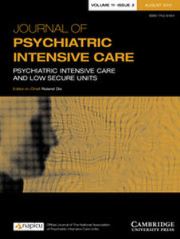Article contents
A survey of antidepressant prescribing at a secure psychiatric hospital
Published online by Cambridge University Press: 20 January 2012
Abstract
Objectives: To study the frequency of use, indications and reported side-effects of antidepressants in the treatment of adult inpatients at a UK secure hospital.
Methods: Cross-sectional survey of the use of antidepressants for forensic rehabilitation patients, together with structured interviews with the treating psychiatrists.
Results: A total of 94 patients (40.7%) were prescribed antidepressants. The majority (68.9%) were prescribed SSRIs. Antidepressant usage was associated with female gender, depression and emotionally unstable personality disorder. Patients with learning disabilities and pervasive developmental disorders were less likely to be prescribed antidepressants than the rest. Only 10 patients (10.6%) had a formal diagnosis of depression, anxiety or obsessive compulsive disorder. For 67.0% of patients the plan was to continue with the antidepressant long-term. Although 83.0% of psychiatrists said they had asked about side-effects, few (14.9%) had asked about sexual side-effects and only 3.2% of patients were reported as having side-effects.
Conclusions: Long-term antidepressant usage in this population was common. The reported incidence of side-effects was very low and is likely to be much higher in reality. Psychiatrists should make regular inquiry about side-effects, including sexual side-effects when appropriate, as well as regularly reviewing the need for continuing treatment.
- Type
- Original Research Article
- Information
- Copyright
- Copyright © NAPICU 2012
References
- 1
- Cited by


